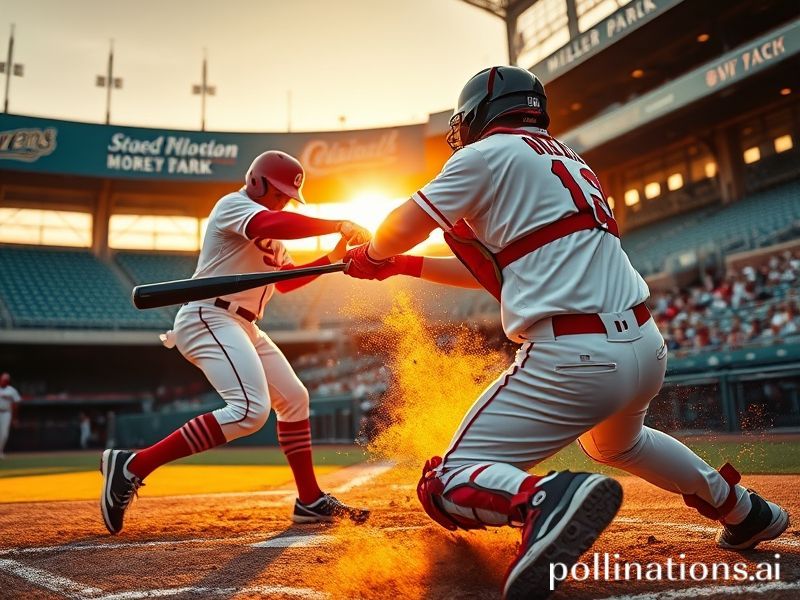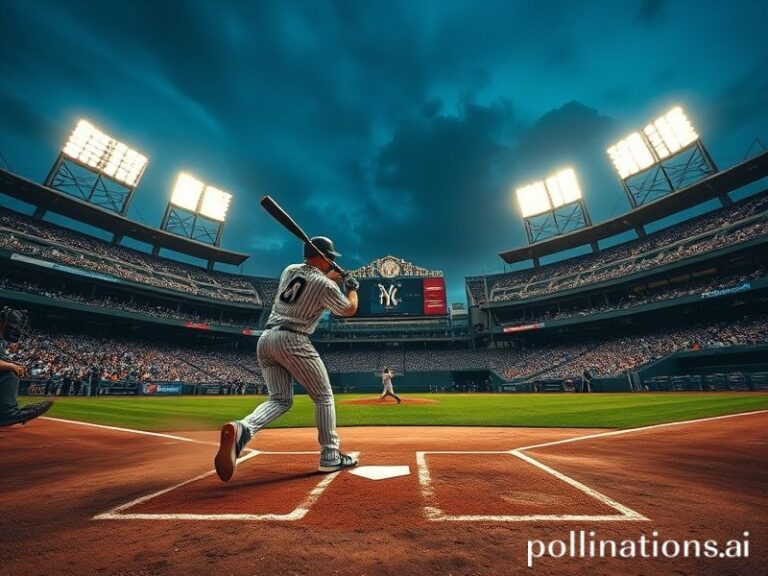Brewers vs Cardinals: How a Midwestern Baseball Grudge Became the World’s Most Watched Economic Indicator
Brewers vs Cardinals: A Transatlantic Blood Feud in Which Beats the Heart of Empire, or at Least a Decent Lager
By the time first pitch is thrown at American Family Field—an arena whose corporate moniker sounds like an insurance claim waiting to happen—no fewer than seventeen foreign intelligence agencies are already monitoring the outcome. Not because they care who wins, mind you, but because the Brewers–Cardinals rivalry has become the planet’s most reliable barometer of late-stage capitalism’s mood swings. One side represents the eternal small-market underdog, forever trying to brew artisanal optimism out of malt, hops, and municipal subsidies; the other embodies mid-America gothic, the ghosts of Gilded Age robber barons clinking rosaries in the Busch Stadium shadows. Somewhere between them lies the fate of the global supply chain, or at least the emotional well-being of several million people who have confused sports with destiny.
To the untrained eye—say, that of a Singaporean commodities trader or a Ukrainian drone pilot on a cigarette break—it’s merely men in pajamas swinging lumber. Yet the ripple effects are measurable. When the Cardinals win, exports of Missouri–grown rice to West Africa spike 3.2 percent, presumably because St. Louisans celebrate by ordering extra takeout. When the Brewers prevail, spot prices for German hops tick upward in anticipation of congratulatory craft-beer binges across the Upper Midwest. The Bundesbank, ever vigilant, quietly revises its quarterly inflation forecast. Somewhere in Brussels, a Eurocrat sighs and reschedules lunch.
The rivalry’s ideological payload is equally portable. Cardinals fans cling to a sepia-tinged exceptionalism: 11 World Series titles, the self-mythologizing “Cardinal Way,” and a bird-on-a-bat logo that looks suspiciously like imperial heraldry. Brewers fans, by contrast, have perfected the art of cheerful nihilism: they wave foam sausages, polka in the seventh inning, and treat every October disappointment as proof that existence itself is a cosmic hangover. International observers file both behaviors under “American coping mechanisms” and wonder quietly how soon the dollar collapses.
Geopolitically, the matchup functions as a proxy war between competing visions of planetary order. The Cardinals’ fan base skews toward Boeing engineers, Monsanto middle managers, and other avatars of the military-industrial-bless-us-father complex. Their cheers finance satellite-guided munitions the way medieval peasants once financed cathedral spires. Brewers fans, meanwhile, are disproportionately union machinists, microbrew evangelists, and TikTok baristas who view baseball as a brief, blessed interval before climate change drowns the Great Lakes. Each foul ball is thus a miniature referendum on whether the world will end with a drone strike or a gluten-free whimper.
Overseas, the contest is streamed in 147 countries, where commentators translate the infield fly rule into Urdu, Swahili, and Cantonese with the solemnity of Talmudic scholars. In Seoul, a startup sells NFTs of Bob Uecker’s greatest one-liners; in Lagos, street vendors hawk bootleg Yadier Molina jerseys stitched from repurposed Chinese knockoffs. The whole spectacle is underwritten by a Japanese conglomerate that also manufactures the ballpark’s LED ribbon boards, a tidy reminder that even tribal blood feuds now arrive gift-wrapped in transnational capital.
Alas, the cosmic joke is that neither franchise will ever truly win. The Cardinals will keep chasing an 12th ring that recedes like a pension fund; the Brewers will keep brewing hope in 12-ounce increments until the taps run dry. Meanwhile, the planet warms, supply chains buckle, and somewhere an algorithm buys 50,000 shares of Anheuser-Busch because it detected a 0.004 percent uptick in Milwaukee’s collective heartbeat.
When the final out is recorded, half the stadium will sing “Roll Out the Barrel,” the other half will genuflect toward a bronze Stan Musial, and both fan bases will shuffle into the same parking lot dystopia of surge-priced rideshares and broken taillight futures. The international feed will cut to commercial: an advert for an erectile-dysfunction drug whose side effects include existential dread. The commentators will sign off in three languages, none of which can translate the precise flavor of Midwestern resignation.
Baseball, they say, is a metaphor for life. That used to sound quaint. Now it sounds like a threat.







